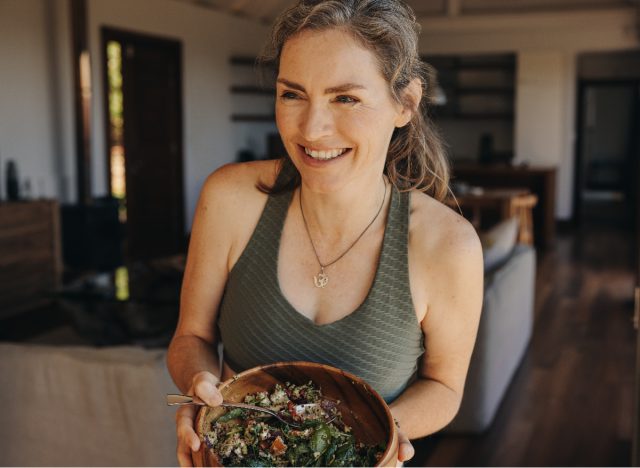Calories are as essential to life as the oxygen you breathe. They provide your body with the energy it needs to sustain all the processes that keep you alive, also known as metabolism. Several factors determine how many calories your body needs to function properly. As you age, your caloric needs may change based on a variety of factors, including your height, weight, body type, activity level, and daily habits.
Think of your caloric needs as a preliminary plan for building a new home. It provides a basic outline of what you’ll need, but you can adjust and customize things like furnishings and decor to suit your preferences.
Likewise, knowing your calorie needs gives you a solid starting point for your nutrition. Once you have a general idea of how many calories you need, you can adjust your diet to align with your specific health goals, such as changing calories to help you lose weight or changing the types of foods you eat to help manage your blood sugar.
Infants and children need a lot of calories Because their bodies are growing quickly. Their caloric needs increase steadily as they grow to support their fast metabolism. Once you reach adulthood, your metabolism typically slows down, so your caloric needs tend to decrease. To support a faster metabolism, it helps to eat a nutritious, protein-rich diet and get regular exercise to maintain and, ideally, build muscle mass as you age.
What are calories and why are they important?

A calorie is a unit of energy that fuels your body’s daily functionsWhen you eat, your body turns food into energy that is either used immediately or stored for later. For one thing, if you consume more calories than you burn, extra energy is stored as fatwhich can lead to weight gain. On the other hand, if you eat too few calories over a long period of time, your metabolism may slow down to conserve energy, making it more difficult to lose weight.
What Affects Your Calorie Needs at Any Age?


As you go through different stages of life, your overall caloric needs tend to decrease. During childhood, when your body is growing rapidly, you need a lot of calories to support that growth. However, as you get older and growth slows, your caloric needs decrease. In early adulthood and beyond, the amount of calories you need depends less on growth and more on your lifestyle, especially your activity level.
Activity level is an important factor in determining your daily caloric needs. For example, if you compare two women of the same height and weight, one training for a half marathon and the other leading a mostly sedentary lifestyle, the athlete will need significantly more calories. That’s because exercise burns more calories than rest, and the body also needs extra calories to recover after exercise. These extra calories help replenish energy stores in the liver and muscles and promote muscle repair and growth.
How your calorie needs change with age:


As you enter adulthood and especially as you age, your caloric needs typically decrease with each passing decade. This is partly because you’re likely to lose muscle and gain fat as you age. Since muscle burns more calories than fat, this change in body composition can reduce the number of calories you burn each day.
Additionally, physical activity often declines with age due to factors such as injury or other physical limitations, further reducing calorie expenditure. Since you’re burning fewer calories, your body needs fewer calories to maintain its metabolism.
Tips for adjusting your diet as you age:


Healthy eating evolves at every stage of life. In youth, the focus is on growth, while in adulthood and beyond, it focuses on preventing chronic disease.
As you age, it becomes less important to pay attention to caloric needs and instead focus on eating a variety of foods that are rich in nutrients that support bone and organ health.
For some, appetite decreases with age, which can lead to a decrease in daily calorie intake and make it difficult to get essential vitamins, minerals, protein, and fiber. As you age, it’s even more important to include protein in every meal and incorporate fruits and vegetables whenever possible to maintain good overall health.
Jessica Wilson, M.Sc., dietitian
Jessica Wilson is a registered dietitian and the founder of The Helpful Dietitian, a blog dedicated to making nutrition education accessible and enjoyable. Learn more about Jessica
#Calorie #Change #Age




